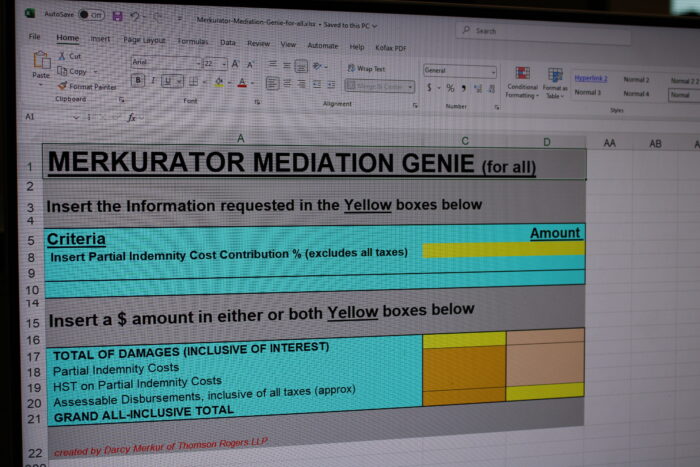Accident Benefit Article
Statutory Accident Benefit Schedule (SABS) Changes Delay of Treatment
Author(s): Leonard H. Kunka
March 1, 2003
A significant concern regarding the new auto insurance regime is that seriously injured motor vehicle accident victims are likely to experience delays of necessary treatment. The following comments highlight some areas of concern for Health Care Professionals in the draft regulations under Bill 198:
- Treatment Plans
- The Treatment Plan form (O.C.F. 18) has expanded from three to six pages with significantly more coding requirements.
- There can only be one comprehensive Treatment Plan from a single healthcare facility in any 30-day period within six months of the accident; and only one plan from a single healthcare facility in any 60-day period thereafter. (Section 38 (2.3))
- Practically speaking, insurers may take as long as they wish to approve Treatment Plans (including Treatment Plans for Assessment Expenses), since there is no sanction for failing to deal with them in a timely fashion. (S.38(8.3))
- Victims who suffer WAD I or WAD II (Whiplash Related Disorders) together with other, more serious injuries, may have treatment for the more serious injuries delayed, while proceeding through the PAF protocols for treatment (Pre-Approved Framework, see below). (S.38(2.1))
- Seven Day Notice Requirement
- Accident victims must provide notice of the accident to their insurer within seven days of the accident. (Section 32 (1))
- Where notice is delayed, the insurer can delay approval of initial treatment, attendant care benefits, income replacement benefits, and funeral expenses and visitor expenses for up to 45 days from the date when the application for benefits is submitted. (Section 32 (7))
- Assessment Plans
- Insurers shall pay reasonable fees charged for assessment expenses (ie required for completing a disability certificate, Form 1, Treatment Plan, or CAT application).
- Before assessing the patient to prepare a Treatment Plan, the assessing practitioner must submit an Assessment Plan (Form O.C.F. 22) to the insurer. The insurer has two business days to review the Assessment Plan and respond if assessment costs are $180.00 or less, and five days if the assessment cost is more than $180.00. (Section 24 (1.3))
- In order to receive payment for assessments completed before insurer approval, the assessing practitioner must demonstrate that the assessment was done because there was “an immediate risk of harm to the insured or a person in the insured’s care”. (Section 24 (1.2) (a) (i))
Treatment of Modest Injuries
- Victims with WAD I or WAD II impairments will receive treatment under a Pre- Approved Framework (PAF). Funding available for the PAF treatment will be between $1,200.00 and $1,500.00, depending on whether a WAD I or WAD II impairment is being treated and whether additional treatment is required for a separate, non-WAD impairment. All treatment will take place within four to six weeks of the accident.
- There will be no DACS or Insurer Examinations while being treated under the PAF. There may only be three assessments without pre-approval; each costing $180.00 or less and each must be completed by a different health care professional. (Section 24 (1.1) (ii) (A) and (B))
Designated Assessment Centre Assessments (DACS)
- Assessment Plans For Seriously Injured Accident Victims
- Expenses incurred for an examination or assessment conducted without an insurer’s approval, are not payable, unless a DAC finds them necessary and reasonable. (Under new Section 24 (1.1))
- Assessments costing more than $180.00 must be approved or denied within five business days (Section 24 (1.3)). Upon denial, the insurer has an additional seven days to notify the DAC, if the Assessment Plan is not submitted with a Treatment Plan. (Section 30 (7))
- If an insured fails to attend a DAC, no benefit is payable until or unless the insured does attend (Section 42 (8) (a) and (b)). The DAC must begin the assessment within two weeks after receiving the request. (Section 43 (4.1))
- If the DAC requests additional information from the insurer, the DAC centre must deliver its report within seven days of receiving the further information from the insurer. (Section 43 (6.1))
- If a Health Care Professional submits an Assessment Plan with a Treatment Plan, then the insurer has 14 days to give notice approving or denying some or all goods and services contemplated by the Treatment Plan. (Section 38 (8.1))
- DACS and The PAF
- DACS will not have any role in relation to the Pre-Approved Framework (PAF) for clients who have sustained WAD I or WAD II injuries. However, DAC’s will be responsible for determining whether treatment recommendations are reasonable and necessary for victims who continue to suffer symptoms beyond the 4-6 week PAF framework.
- DACS and Insurers
- Once an insurer has denied an Assessment Plan, it must notify the DAC within seven days (Section 43 (1) (a)). If the insurer does not notify the DAC within seven days, the insurer must pay the expenses in dispute up to the day the insurer gives notice.
- Upon receipt of the insurer’s notice, the DAC must promptly notify the insured person (Section 43 (1) (b)). If the DAC requires additional information, the insured person and/or the insurer shall provide the DAC with that information. However, Section 43 (2) (a) does not oblige the insurer to do so within any time frame.
- The DAC must deliver a report within seven days for “assessments”:
- Evaluating whether an assessment is reasonable, or
- Determining whether the claimant should obtain additional treatment following PAF treatment, or
- Determining if an Assessment Plan is reasonable. (Section 43 (6.1))
- Otherwise, the DAC shall deliver its report within 14 days of the completion of the assessment. (Section 43 (4.1))
- If a Health Care Professional submits an Assessment Plan without a Treatment Plan, the insurer must approve part or all of the Plan within seven days, or deny the Assessment Plan. If notice is not given within seven days, the insurer shall pay for the Assessment expense (Section 37.1 (8)) within 30 days of receiving an invoice.
- DACS Presumed Correct
- The draft Regulations provide that, in court proceedings or arbitration hearings, the opinion of person(s) who conduct a designated assessment is presumed correct unless the contrary is shown on a preponderance of the evidence.
- The draft Regulations provide that, in court proceedings or arbitration hearings, the opinion of person(s) who conduct a designated assessment is presumed correct unless the contrary is shown on a preponderance of the evidence.
- DACS and Attendant Care
- Where notice of the accident is provided to the insurer within seven days of the accident and where attendant care benefits have been applied for, the insurer must deny any such application within 14 days of receiving the application or Form 1. (Section 39 (4))
- If the insurer denies the attendant care claimed, the benefits remains payable pending receipt of the DAC report and the insurer shall notify the DAC within seven days of its denial. (Section 43 (1)(a))
- If a DAC is to be completed in relation to attendant care, the DAC must begin the assessment within two weeks after receiving the request for the designated assessment.
- DACS and Insurer Examinations
- The person who conducts DACS shall not conduct Section 42 insurer assessments.
Pursuing Payment Of Outstanding Treatment Expenses
- Treatment providers will no longer be able to take an assignment from the accident victim for the right to mediate, arbitrate or sue for unpaid treatment expenses.
Share this





